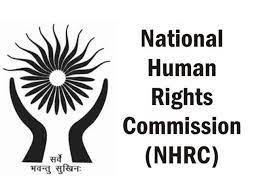National Human Rights Commission (NHRC)
About
NHRC of India is an independent statutory body established on 12 October, 1993 as per provisions of Protection of Human Rights Act, 1993, later amended in 2006.
- NHRC has celebrated its Silver Jubilee (25 years) on October 12, 2018. Its headquarter is located in New delhi.
- It is the watchdog of human rights in the country, i.e. the rights related to life, liberty, equality and dignity of the individual guaranteed by Indian Constitution or embodied in the international covenants and enforceable by courts in india.
- It was established in conformity with the Paris Principles, adopted for the promotion and protection of human rights in Paris (October, 1991) and endorsed by the General Assembly of the United Nations on 20 December,1993.
Background
Universal Declaration of Human Rights (UDHR) was adopted by the United Nations General Assembly in Paris on 10 December 1948.
- It is a milestone declaration in the history of human rights which sets out, for the first time, fundamental human rights to be universally protected.
- Human Rights Day is observed every year on 10 December, which is the anniversary of the UDHR. In 2018, Human Rights Day marked the 70th anniversary the declaration.
- In due time the growing importance of strengthening national human rights institutions has been recognized and in 1991, a UN meeting in Paris has developed a detailed set of principles i.e. Paris Principles. These principles became the foundation for the establishment and operation of national human rights in the country.
- In pursuant to these principles, India has enacted the Protection of Human Rights Act, 1993, with a view to bring about greater accountability and strengthening of the human rights in the
- This act also authorized State Governments to establish State Human Right commission.
Structure of the Commission
- NHRC is a multi-member body which consists of a Chairman and seven other Out of the seven members, three are ex-officio member.
- President appoints the Chairman and members of NHRC on recommendation of high-powered committee headed by Prime Minister.
- The Chairperson and the members of the NHRC are appointed for 5 years or till the age of 70 years, whichever is Earlier.
- They can be removed only on the charges of proved misbehavior or incapacity, if proved by an inquiry conducted by a Supreme Court Judge.
- Commission also has five Specialized Divisions e. Law Division, Investigation Division, Policy Research & Programmes Division, Training Division and Administration Division.
- The chairman and the members of State Commission are appointed by the Governor in consultation with the Chief Minister, Home Minister, Speaker of Legislative Assembly and Leader of the Opposition in the State Legislative Assembly.
Functions and Powers of NHRC
- NHRC investigates grievances regarding the violation of human rights either suo moto or after receiving a petition.
- It has the power to interfere in any judicial proceedings involving any allegation of violation of human right.
- It can visit any jail or any other institution under the control of the State Government to see the living conditions of the inmates and to make recommendations thereon.
- It can review the safeguards provided under the constitution or any law for the protection of the human rights and can recommend appropriate remedial measure.
- NHRC undertakes and promotes research in the field of human rights.
- NHRC works to spread human rights literacy among various sections of society and promotes awareness of the safeguards available for the protection of these rights through publications, media, seminars and other means.
- The Commission takes an independent stand while providing opinions for the protection of human rights within the parlance of the Constitution or in law for the time being enforced.
- It has the powers of a civil court and can grant interim relief.
- It also has the authority to recommend payment of compensation or damage.
- NHRC credibility is duly reflected in large number of complaints received every year and the trust reposed in it by the citizens.
- It can recommend to both the central and state governments to take suitable steps to prevent the violation of Human It submits its annual report to the President of India who causes it to be laid before each House of Parliament.

